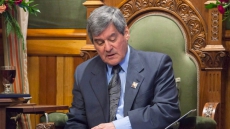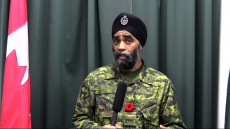TORONTO — Since arriving in Canada seven months ago, Abeer Al Hajj has learned a lot about her new country and how it differs from her native Syria.
Abeer, who turned nine last week, came to Toronto with her parents and two brothers in November as privately sponsored refugees and was almost immediately enrolled in school as well as language classes to bolster her fledgling English.
In many ways, the transition has been seamless — she has friends, throws herself into her school work and speaks English easily and enthusiastically.
But some aspects of Canadian culture remain puzzling, the girl said on a recent afternoon.
"Here in Canada, they say too much 'thank you' — 'thank you' and 'welcome' and 'sorry' and 'excuse me,'" she said.
"My teacher, she gave me book to read, I gave it back and she said thank you," something that would never have happened in Syria, where teachers have a more authoritarian approach, she said.
With Canada Day fast approaching, another mystery has emerged for Abeer and her family: how does their new home celebrate its national holiday?
All the girl knows, she said, is that "there's no school."
Celebrating their adoptive country is both a major milestone and a source of uncertainty for many Syrian newcomers, said Safwan Choudhry, spokesman for the Ahmadiyya Muslim Jama'at, an organization that has helped several families settle in.
"I can tell a lot of them are anxious, they want to see what do Canadians do," he said.
"And I understand where they're coming from because typically, every country celebrates their national day very differently," in many cases with a strong emphasis on military glory, he said.
"So the majority are just curious to see what's going to happen...and I got the sense that a lot of them just want to stand back and watch and soak in how we celebrate Canada Day."

Many Syrian families in the Toronto area are expected to attend the annual Canada Day celebration hosted by the Ahmadiyya Muslim Jama'at, a massive event that typically draws thousands and is set to take place outside a mosque in Vaughan after afternoon prayers.
Choudhry said the Friday sermon will centre on Canada Day and loyalty to one's country.
The festivities will see a group of children sing the national anthem, Abeer among them. The girl said she has been practising on top of the daily singalong at school.
But a key part of the celebration — the barbecue — will be off-limits for Muslims fasting for Ramadan. The month-long ritual precludes participants from eating or drinking between sunrise and sunset and its timing is set by the lunar calendar.
The last Friday of Ramadan is particularly significant and turnout is expected to be even higher than usual since most people will have the day off because of the statutory holiday, Choudhry said.
Next year, Canada Day will not fall during Ramadan, he said.
"The timing of it and the way that it's falling together, I think there is some significance, but I think particularly for Syrian refugees, I get the sense every time I talk to them, it's very emotional for them," he said.
The knowledge that they can pay tribute to their new country while also maintaining their religious practices comes as great comfort to Abeer's family, her father Muhammad Al Hajj Abdullah, 40, said.
Living in Canada has also offered Abdullah, who is in a wheelchair, another type of freedom, he said.
After an explosion in the Syrian town of Aleppo left him paralyzed from the waist down, the father of three found himself unable to get around easily despite having a manual wheelchair, he said.
"In Syria and Turkey, it's so so hard, you can't ride the bus, you can't ride the subway," he said.
On his arrival here, the Ahmadiyya Muslim Jama'at gave him an electric wheelchair which, along with accessible transit, have allowed him to regain his independence, he said.
On a recent weekday evening, he played ping-pong with his youngest son, five-year-old Bashir, on a coffee table in the family's living room in north Toronto, while Abeer did her homework and the oldest child, Abdul Karim, bounced a soccer ball.

"New community, new society, new language, new weather," Abdullah said with a laugh. "Everything has changed."



